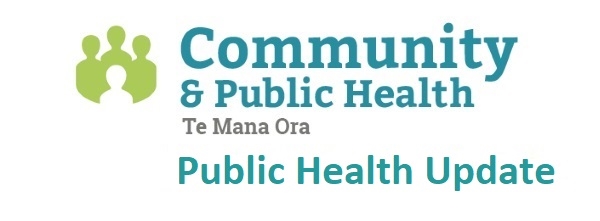28 February 2025
Pertussis

The national pertussis epidemic is ongoing in 2025, with 10-20 cases notified each week in the Te Mana Ora districts. Pertussis rates are currently higher in the south (Te Waipounamu and Central regions) than in the north of the country, and are higher in Māori and Pacific peoples. Surveillance data is updated weekly on the ESR Pertussis Dashboard.
Public health staff depend on good information from general practice to triage notifications and target our efforts. If you suspect that your patient has pertussis, please:
- Check HealthPathways for testing and notification advice
- Gather the “disease-specific information” in the HealthPathways drop-down, and include that information in your notification.
Vaccination of infants and other high-risk people remains the key prevention measure for pertussis. Please:
- Advise pregnant people of the increase in pertussis and recommend the free Boostrix vaccination from 16 weeks in every pregnancy
- Encourage pertussis vaccination for the extended whānau of pregnant people, new babies and infants, although depending on their age they may not be eligible for a funded vaccine
- Prioritise on time immunisation for all babies at 6 weeks, 3 and 5 months, and boosters at 4 years and 11 years for children
- Encourage all staff, including reception and administrative staff, to be protected from pertussis as well as influenza and measles. Booster vaccinations are recommended for all lead maternity carers and healthcare workers who are in daily contact with infants.
Adults aged 45 years (if they haven’t already had 4 vaccines) and 65 years are also eligible for a free pertussis booster.
Christchurch Local Alcohol Policy

Christchurch City Council intends to introduce its first Local Alcohol Policy. Local alcohol policies can reduce the harm caused by alcohol by regulating how alcohol is sold and supplied. Local alcohol policies can include policies to restrict the number, location, and opening hours of bars, cafés, restaurants, supermarkets and bottle stores.
Health professional can play an important role in highlighting the health impact of alcohol use, and its implications for your patients. Online feedback on possible options for conditions and rules in the Christchurch Policy is open until 9th March.
Notification of hazardous substance injuries

Te Mana Ora has recently dealt with several cases of hazardous substance injury that were not reported by the medical practitioners who dealt with them. Health professionals are legally responsible under the Hazardous Substances and New Organisms Act 1996 for reporting injuries or disease caused by a hazardous substance. Under the Act, hazardous substances are defined as anything that can:
- Explode
- Catch fire
- Oxidise
- Corrode
- Be toxic to humans
This includes firework injuries, chemical burns, including all chemical eye injuries, carbon monoxide poisoning lead poisoning, and ingestion of cleaning products by children (medications and alcohol are excluded).
Notification of hazardous substance injuries is an important tool for surveillance and future injury prevention. Information on how to notify, with relevant links, is available on HealthPathways under Hazardous Substance Injury Reporting.
Rheumatic fever

There has been an increase in acute rheumatic fever (ARF) cases in Waitaha from two cases in 2023 to ten cases in 2024.
Nationally, ARF hospitalisations have rebounded, following a downward trend during the COVID-19 elimination-suppression strategy. Rates are now 3.7 per 100 000 in 2023/24, compared with 1.5 in 2021/2022. The highest hospitalisation rates for rheumatic fever are in Pacific peoples (23.6 times higher), followed by Māori (11.8 times), compared to European and Other ethnicities.
Diagnosis of ARF is important for timely management. An assessment guideline is available on HealthPathways.
On-time treatment of group A streptococcal throat infections and skin infections assists in reducing the risk of ARF. Long-term antibiotic prophylaxis of rheumatic fever cases can reduce the risk of developing severe rheumatic heart disease. Regular long-term follow-up of confirmed cases is fully funded in primary care.
If you know of families with children that may benefit from a housing assessment, Tamaiti Healthy Homes may be able to assist. The recent publication of epidemiologist Dr Jason Gurneys book ‘The Twisted Chain’ highlights the role of unsuitable housing in the risk of ARF.
|

